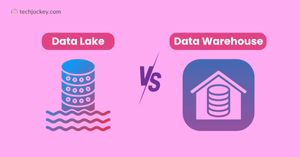Businesses generate data every second, each customer transaction and website clicks to supply chain updates and employee activity. But having data is not enough. The only thing that counts is how you handle it, examine it and apply it in making sound decisions.
That’s when businesses apply data warehouse software. It provides a secure, well-organized means of storage and retrieval of large amounts of data across various sources by the companies. Having the appropriate software available, teams are able to get reports in less time, identify trends sooner and justify major decisions with actual evidence.
What Is Data Warehouse Software?
The data warehouse software is a platform where data is collected across numerous systems and stored there. A data warehouse is created to support the high usage of analysis, reports, and storage as opposed to the daily transaction-oriented nature of traditional databases.
It operates by collecting data from tools, such as CRM, ERP, marketing platform, and spreadsheets. This information is then cleaned, tabulated and stored in such a format that it is easy to search and analyze.
Data warehouse software helps businesses:
- Put data across various departments in one source of truth.
- Generate complicated reports without interruption with the core systems.
- Enhance the use of business intelligence tools.
- Track historical trends over months or years
- Stay audit-ready with consistent, centralized records
Key Benefits of Using Data Warehouse Software
Here are some of the benefits of incorporating data warehouse software into your business:
- Centralized Data Access: Data warehouse software gathers the information of various sources and pulls it to a single system. This eradicates silos of data and provides your team with one point to access data that is up-to-date and consistent.
- Faster and Smarter Decision-Making: All your business data in one spot allows you to make better decisions of a greater quality quicker and with less effort by generating reports, analyzing trends, and recognizing more. You do not need to spend time scrolling through tools or making IT teams drag reports.
- Improved Data Accuracy and Consistency: In the case of many places data can be stored, there is a higher possibility of a mistake. A warehouse helps make sure that the information is purged, formatted and stored in a uniform manner. This enhances accuracy and increases confidence in reporting.
- Support for Business Intelligence Tools: Business intelligence tools such as Tableau, Power BI, and Looker are compatible with data warehouses. This simplifies the visualization of your data, execution of dashboards and identification of trends which shapes business strategy.
- Historical Data Analysis: The majority of the operational systems will only keep recent data. A warehouse provides you with long-term storage that allows monitoring performance monthly or even at the end of the year. This helps in making predictions, tracking of goals and comparing two years.
- Better Performance for Source Systems: A warehouse takes off the heavy work that is strangling your CRM or ERP. This will ensure that your core systems are operating as intended and your analytics team is operating in the background.
Top Features to Look for in Data Warehouse Software
Here are some of the features that you must look for in a Data Warehouse Software:
- Real-Time Data Processing: Look for software that supports real-time or near-real-time data ingestion and processing. This can assist businesses in making quicker and evidence-based decisions without having to await mass updates.
- Automated Data Integration: A quality data warehouse will interface with many data sources including cloud apps, databases, CRM, ERP, and APIs, and none of these will require any manual code. In-built ETL/ELT tools are more time-saving and consistent.
- Scalability and Elastic Storage: The data management system tool you choose must be able to support the growing data volumes without compromising the performance. Cloud-native warehouses are also capable of scaling automatically, so you can only pay as you use it.
- High-Performance Query Engine: Fast query processing is key for analytics and reporting. Look for tools that use columnar storage, indexing, or in-memory computing for faster performance even on large datasets.
- Data Security and Access Control: This is to assure that the software provides a high level of security through encryption, user authentication and role based access control. It must also be in agreement with such standards as GDPR, HIPAA, or SOC 2.
- Data Governance and Lineage: The platform should provide clear visibility into data sources, transformations, and flows. Built-in data governance tools help maintain quality, consistency, and regulatory compliance.
- Support for Structured and Semi-Structured Data: Ideally, the platform must support more than just structured data (SQL) but should also support semi-structured data, such as JSON, XML, or Parquet, in particular when dealing with API and web-based data.
- Built-In Analytics and BI Tool Compatibility: Select software that will be compatible with BI tools such as Tableau, Power BI or Looker. There are even data warehouses that are built with in-built dashboards and visualization capabilities.
- Low-Latency Data Access: In case your business requires fast data access such as reporting, dashboards or customer apps. In that way, you need to decide on a solution that will reduce the time of data retrieval across locations.
How to Choose the Right Data Warehouse Software for Your Business?
Here’s a simple step-by-step approach to help you decide which software you choose:
- Assess Your Data Needs and Volume: Start by identifying the type and amount of data your business collects. Are you dealing with structured, semi-structured, or unstructured data? Knowing your data types will help you choose a platform that can handle and process them efficiently.
- Define Your Business Goals: Determine your purpose of your data warehouse. Do you want real time reporting, predictive analytics or improved decision-making? Your priorities will be informed by your goals as far as feature and integration are concerned.
- Set a Budget: It is highly important to not only look at the start-up price, but also look at the long term costs. This contains storage, data transfer, user license, support and upgrades. Cloud solutions are usually charged on a flexible basis whereas on-premise solutions cost a lot on initial investment.
- Check Integration Capabilities: Be sure that the software is easy to integrate with the existing tools you already have there, CRM, ERP, BI tools and data sources. Integration will assist you in creating the full picture of your operations without having to enter data into the system manually.
- Prioritize Security and Compliance: This is important when dealing with sensitive data. Find such features as role-based access, encryption, and adherence to such regulations as GDPR, HIPAA, or SOC. Depending on your business, industry specific compliance may be relevant as well.
- Test Ease of Use and Support: The most suitable platform is not always so that your team can find it easy to use. Select software that has an intuitive interface, well-documented and helpful support. Demo and training are options that can be asked to the vendors before making a decision.
- Look at Vendor Reputation and Roadmap: Review comments, case studies, and user reviews. Look at the product roadmap of the vendor to make sure that it is being continuously improved and innovated. An efficient supplier will aid in your future development.
Top 10 Data Warehouse Software in India
| Top Data Warehouse Software Comparison Table |
| Software | Real-Time Processing | Scalability | Integrations | Security & Compliance | AI & ML Capabilities |
| Azure Synapse Analytics | Yes | High with on-demand pools | Power BI, Dynamics 365, SQL, Spark | Azure AD, Role-based access, GDPR | Built-in Spark, ML services, Azure ML |
| Google BigQuery | Yes | Serverless and elastic | Google Workspace, Looker, APIs | AES-256, ISO 27001, GDPR | BigQuery ML for in-database ML models |
| Autonomous Data Warehouse (Oracle) | Yes | Auto-scaling cloud | Oracle Cloud, 3rd-party BI tools | Always-on encryption, HIPAA, GDPR | AutoML, Oracle ML Services |
| Amazon Redshift | Yes | Elastic via RA3 nodes | AWS ecosystem, 3rd-party tools | VPC, IAM, SOC 1/2/3 | Redshift ML with Amazon SageMaker |
| SAP Datasphere | Yes | Enterprise-grade | SAP + non-SAP connectors, APIs | SAP BTP security, GDPR | Embedded ML with SAP AI Core |
| Snowflake | Yes | Cloud-native, multi-cluster | 200+ integrations (BI, ETL, apps) | SOC 2 Type II, HIPAA, GDPR | Snowpark ML, partner ML integrations |
| Teradata VantageCloud | Yes | Hybrid and multi-cloud | Azure, AWS, Google Cloud, 3rd-party | Role-based access, data encryption | Integrated Vantage Analytics, ML Engines |
How Do We Choose the Best Data Warehouse Software for You?
At Techjockey, we focus on what really matters when recommending data warehouse software. We consider such features as real-time data processing, simple scalability, solid integrations with your analytics tools, and secure data management.
We also test the ability of the software to deal with large data, automation, and compatibility with cloud or hybrid.
Our assumptions are based on actual user reviews, reputation of vendors and the clarity of pricing and support structures. Growing a small business and just beginning to use analytics, or need a large system capable of handling complex data, we assist you in identifying a solution that is quick, dependable, and set to expand alongside you.
Why Choose Techjockey for the Best Data Warehouse Software?
Techjockey simplifies the process by enabling one to compare and select the appropriate data warehouse software. Regardless of whether you are creating your new analytics infrastructure or whether you are upgrading your existing system, we introduce reliable tools that are well-suited to your business size, budget and objectives.
We provide genuine consultation, free trials, and direct comparisons to enable you to make the correct choice of platform. Techjockey is your reliable ally in making smarter and faster, more informed data decisions with expert knowledge, verified tools, and feedback about data decisions by real users.

















